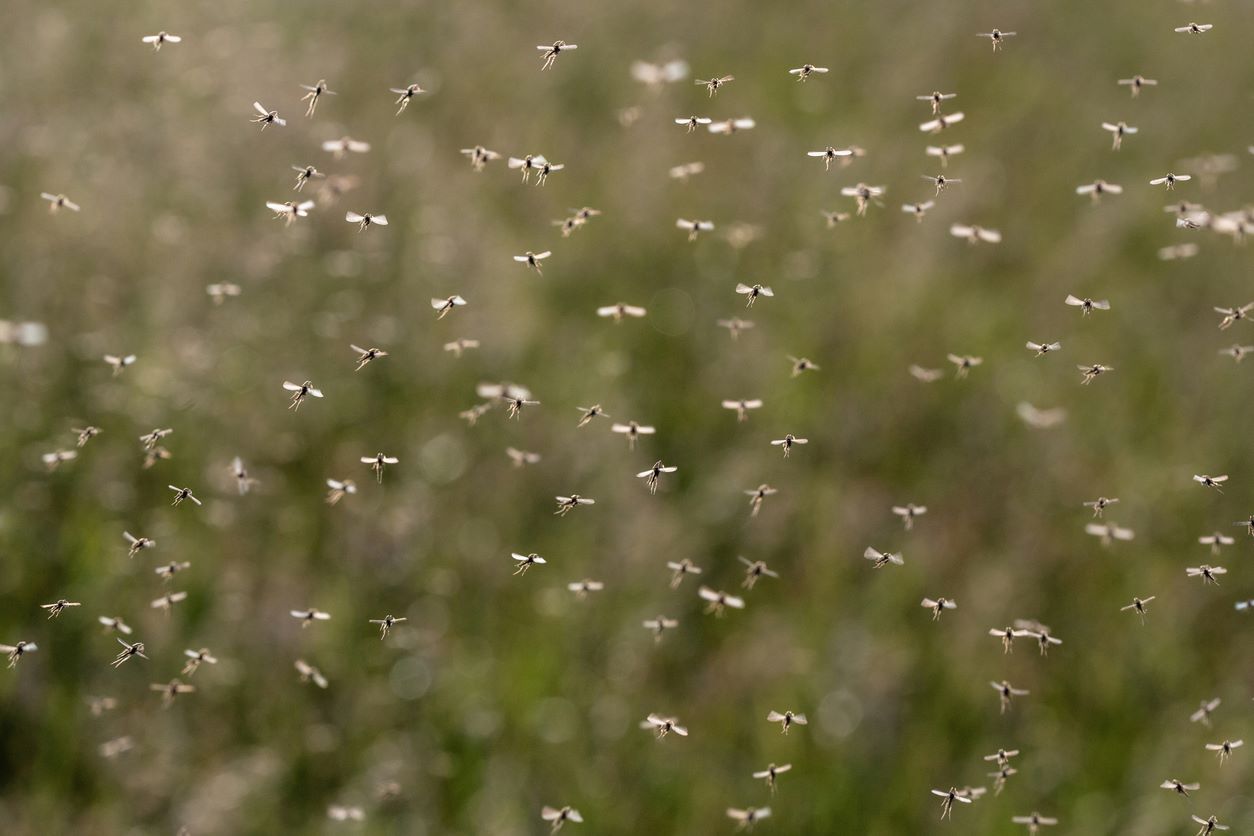Mosquitoes. The mere mention of the word conjures up images of itchy red bumps and swatting frantically at the buzzing annoyance. While their bites are certainly a nuisance, the true danger of mosquitoes is in their ability to transmit a multitude of serious diseases.
This blog delves into the hidden dangers of these tiny pests, exploring the various mosquito-borne diseases, their impact on public health, and effective measures to take control of your yard and reduce the risk of mosquito-borne illnesses.
Mosquito Dangers You Should Be Aware Of
It’s easy to underestimate the threat posed by mosquitoes due to their small size. However, these insects are the deadliest animal on Earth according to the Centers for Disease Control and Prevention (CDC). This startling fact stems from their role as vectors, or organisms that can transmit infectious diseases between humans or animals.
Mosquitoes transmit a wide range of mosquito-borne diseases (MBDs) through their bites. When a mosquito feeds on an infected individual or animal, it ingests the disease-causing pathogens. These pathogens then multiply within the mosquito and can be passed onto the next person it bites.
A Look at Common Mosquito-Borne Diseases
The list of mosquito-borne illnesses is extensive, with varying levels of severity. Here’s a glimpse into some of the most common MBDs:
- Malaria: This potentially life-threatening illness is caused by a parasite and can cause symptoms like fever, chills, sweating, muscle aches, and fatigue. According to the World Health Organization (WHO), malaria caused an estimated 608,000 deaths globally in 2022.
- Dengue Fever: This mosquito-borne viral infection is found in tropical and subtropical regions. Dengue fever causes flu-like symptoms and can progress to a severe form, Dengue Hemorrhagic Fever, which can be fatal.
- West Nile Virus: This virus can cause mild illness with fever, headache, and body aches, but in some cases, it can lead to severe neurological diseases such as meningitis and encephalitis.
- Zika Virus: This mosquito-borne viral infection has gained attention in recent years due to its potential to cause birth defects in babies born to infected mothers. Zika can also cause fever, rash, joint pain, and conjunctivitis (pink eye) in adults.
These are just a few examples, and the specific mosquito-borne illnesses prevalent in your area will depend on various factors like climate and geography.
The Ripple Effect: Public Health Concerns of Mosquito-Borne Illnesses
The impact of mosquito-borne diseases extends far beyond individual health. MBDs pose a significant public health concern, placing a strain on healthcare systems and economies.
- Health Implications: Even with the wide array of modern healthcare technology and advancements available today, MBDs can still pose a serious risk, particularly to those with compromised immune systems.
- Economic Burden: The costs associated with treating and preventing mosquito-borne illnesses are substantial. For example, malaria alone is estimated to cost the global economy billions of dollars annually in lost productivity.
- Travel Disruptions: The presence of MBDs in certain regions can deter travel and tourism, impacting local economies.
- Social Disruption: Outbreaks of mosquito-borne diseases can lead to school closures, workplace disruptions, and social isolation for infected individuals.
Taking Control: Effective Mosquito Reduction Strategies
The good news is that there are steps you can take to reduce the risk of mosquito-borne illnesses in your own backyard:
- Eliminate mosquito breeding sites: Mosquitoes lay their eggs in stagnant water. Regularly empty any containers that hold water, such as tires, buckets, and clogged gutters.
- Reduce outdoor exposure during peak mosquito times: Mosquitoes are most active at dawn and dusk. Consider staying indoors during these times or wearing long sleeves and pants if you must be outdoors.
- Utilize insect repellents: Choose an EPA-registered insect repellent containing DEET, picaridin, or oil of lemon eucalyptus to deter mosquito bites. Effective mosquito repellents are commercially available at most home and outdoor stores, as well as some grocery stores.
- Use professional pest control: Professional pest control companies have tried-and-true methods of mosquito control, ranging from exclusion and prevention to chemical mosquito treatment. Hiring a pest control company to treat your yard at the beginning of the summer can help keep your property mosquito-free all summer long.
Dewey Pest and Termite Control – Your Mosquito Defense Ally
While preventive measures are helpful, for comprehensive mosquito control, consider partnering with a professional pest control company. Dewey Pest and Termite Control offers effective mosquito treatment plans that target adult mosquitoes and eliminate breeding grounds in your yard. Our trained technicians utilize the latest advancements in mosquito control methods to create a barrier of protection around your home, keeping you and your loved ones safe from mosquito bites and the diseases they can carry.
Don’t let mosquitoes turn your outdoor haven into a health hazard. Contact Dewey Pest and Termite Control today to schedule a consultation and reclaim your yard from these unwelcome guests. Let’s work together to create a safe and enjoyable outdoor space for you and your family this summer.



